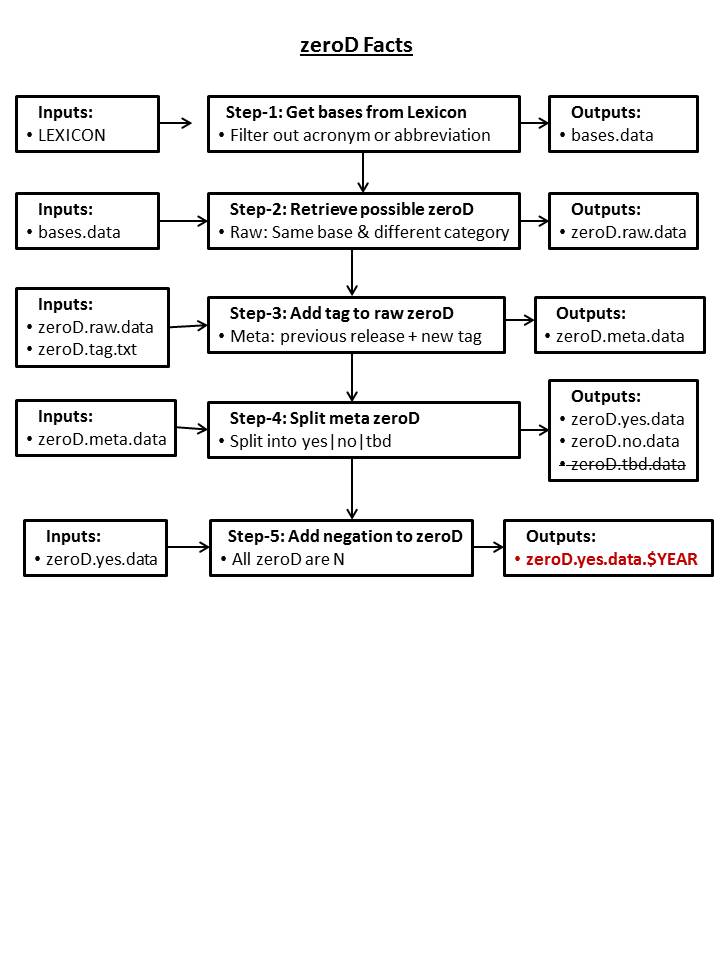Zero Derivations
I. What are zero derivations
Conversion is a linguistic process that assigns an already existing word to a new syntactic (grammatical) category (part of speech) without any concomitant change in form (Lieber 2005: 418).
It is the processes that may take part in the creation of new lexemes in English (Valera 2004: 20).
This process is also known as a functional shift or zero derivation.
II. Zero derivation pairs in LEXICON
The base form and category are coded in the LEXICON. All words with same base form and different categories can be retrieved from LEXICON. However, the retrieved list is over-generated. Computer programs were developed to filter invalid derivation pairs (acronyms, abbreviations, and word size = 1) and facilitate human tagging process to generate zero derivations table.
In practice, zeroD also include follows:
cesarian|adj|cesarean|noun
partisan|adj|partizan|noun
first-class|adj|first class|noun
latin-american|adj|Latin American|noun
low-density|adj|low density|noun
However, we don't generate this type of zeroD from Lexicon because the spelling are not identical. Instead, we just categorize these dPairs as zeroD because there is no suffixation or prefix processes involved.
Also, we include compounds in zeroD (Huddleston and Pullum does not consider compounds zero derivations). For example:
roadmap|noun|E0511182|roadmap|verb|E0727494|yes
side-swipe|noun|E0587613|side-swipe|verb|E0587614|yes
step section|noun|E0730390|step section|verb|E0730391|yes
step-section|noun|E0730390|step-section|verb|E0730391|yes
off site|adj|E0728198|off site|adv|E0728199|yes
off-site|adj|E0728198|off-site|adv|E0728199|yes
offsite|adj|E0728198|offsite|adv|E0728199|yes
Please also refer to Lynn's notes for more details.
ZeroD pairs could include bases with different cases. Fro examples,
III. Processes
${DERIVATIONS}/ZeroDerivations/data/${YEAR}/dataOrg/LEXICON
The latest LEXICON from lexicon.${YEAR}
${DERIVATIONS}/ZeroDerivations/data/${YEAR}/dataOrg/zeroD.tag.txt
A manual tag file for zero derivation. The baseline of this file is the previous year tag file. The tagged file of zeroD.tbd.data is then added. The format of this file is:
| base | category-1 | EUI-1 | base | category-2 | EUI-2 | tag |
shell>cd ${DERIVATIONS}/ZeroDerivations/bin
shell>GetZeroD ${YEAR}
5

IV. Program Details (GetZeroDerivations)
nobody|pron|E0042734|nobody|noun|E0042735|yes
down|noun|E0023849|down|prep|E0023850|yes
dare|verb|E0020794|dare|modal|E0020796|yes
nightly|adj|E0042640|nightly|adv|E0042641|yes
that|det|E0060479|that|compl|E0060480|yes
before|adv|E0012237|before|conj|E0012239|yes
flexion|noun|flex|verb|true
flexure|noun|flex|verb|true
flex|noun|flex|verb|true
| base | category | inflection | EUI |
| base | category-1 | EUI-1 | base | category-2 | EUI-2 |
Please note that not all zero derivation pairs retrieved from LEXICON (step 2) are valid derivation pairs. We define an seven fields (pipe separated) format for tagging the zero derivation pairs to validate derivational variants:
| base | category-1 | EUI-1 | base | category-2 | EUI-2 |
Examples
fast|adj|E0027369|fast|noun|E0027371|no fair|noun|E0027197|fair|verb|E0538382|no
| base | category-1 | EUI-1 | base | category-2 | EUI-2 | tag |
| base | category-1 | EUI-1 | base | category-2 | EUI-2 | tag |
| base | category-1 | EUI-1 | base | category-2 | EUI-2 |
| base | category-1 | EUI-1 | base | category-2 | EUI-2 | negation |